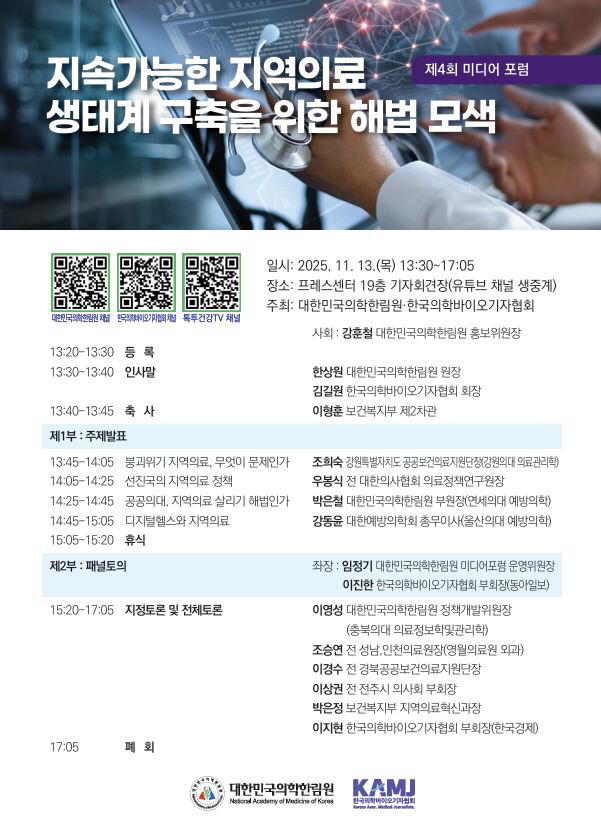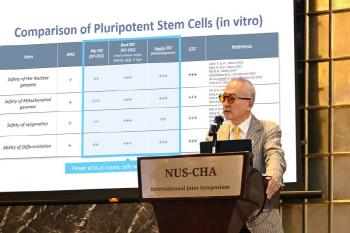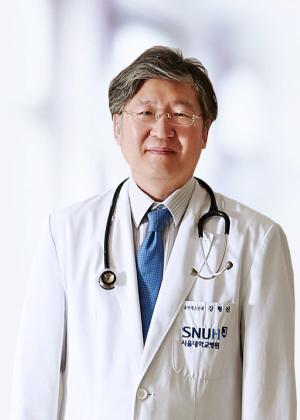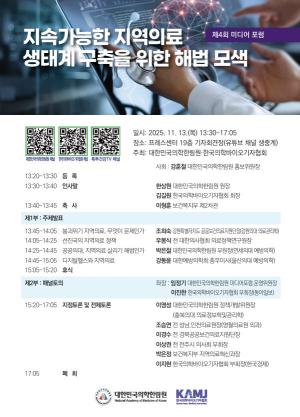The collapse of local healthcare is a failure of the system...Need to focus on tweezers beyond one-off measures
Nov 13, 2025
The collapse of regional medical care is a structural problem arising from the lack of a metropolitan area-centered policy and a local medical system, and it has been suggested that a multi-layered regional medical system should be established away from the existing medical policy framework based on health insurance.
On the 13th, the Korea Medical Biojournalists Association (U.S. Medical Association) and the Korea Medical Institute (KMA) jointly held the 4th Media Forum under the theme of 「Searching for solutions to build a sustainable local medical ecosystem」 at the press conference of the Korea Press Center and presented policy directions focusing on these contents.
Cho Hee-sook, head of the Gangwon State Public Health and Medical Support Center (Professor of Kangwon Medical University's Medical Management Class), who was in charge of presenting the theme of `Collapse Regional Medical Care, What's the Problem.' pointed out that `The paradox that local hospitals do not have patients and patients do not have hospitals is not contradictory, but as a result of structural problems.'
Cho Hee-sook explained that the region lacks the capacity to finally treat severe diseases, and that the decline in population, the medical treatment-centered fee system, and the departure of medical personnel from the region will lead to a vicious cycle in which patients and medical supplies are concentrated in large hospitals in the Seoul metropolitan area.
"The collapse of local medical care is not just a problem of a lack of doctors, but a failure of the medical system," Cho said. "It is a multi-layered and structural problem that combines policies designed as a single framework nationwide during the compression growth period, insurance structure centered on the number of actions, development centered on the metropolitan area, and expansion of wide-area transportation networks."
In response, Cho said, `Vulnerable areas that have been neglected by market logic within the health insurance system need intensive support for one-time business expenses or simple fees beyond the additional cost.'"In the mid- to long-term, we need to redesign the patient's medical use system and support manpower, facilities, and finances together to increase local medical capacity."
Woo Bong-sik, former head of the Medical Policy Institute of the Korean Medical Association, then compared and analyzed regional medical policies in major countries such as the United States, Japan, Germany, and the United Kingdom through the announcement of 「Local Medical Policy of Advanced Countries」 and explained the structural characteristics of Korea's regional medical problems.
Former researcher Woo Bong-sik cited examples of advanced countries operating complex policy packages such as ▲ financial incentives ▲ local compulsory service ▲ strengthening clinical education ▲ utilizing non-doctors ▲ telemedicine.
He added "South Korea has a high overall level of medical care, but it needs to be improved in terms of regional medical gaps and treatable mortality."There is a limit to simply expanding public medical schools and public hospitals, and system design suitable for domestic reality, such as local quota system, away treatment support, and reinforcement of local training," he stressed.
He also urged "We recognize the regional health care issue as a joint task to move toward a sustainable health care system rather than as a subject of conflict, and hope that it will develop into a multi-layered and balanced policy discussion."
Subsequently, Park Eun-chul, vice president of the Academy of Medicine (Professor of Preventive Medicine at Yonsei University), presented a presentation under the theme of 「Public Medical College, is it a solution to revive local medical care」.
Vice President Park Eun-cheol said, `Although the establishment of a public medical college is being discussed to resolve the medical imbalance and essential medical gaps between regions, the policy of local medical doctors through public medical institutions was not well-received in terms of cost, effectiveness and timing compared to existing policies such as local talent screening, contract-type local essential medical institutions, senior medical doctors support projects, and public health doctors system", he pointed out.
Vice President Park suggested ▲ establishment of medical rights and intervention ▲ improvement of patient transfer system ▲ strengthening regional medical responsibility ▲ use of information and intelligence technology as a way to recover local medical care.
Kang Dong-yoon, general affairs director of the Korean Society for Preventive Medicine (Professor of the Ulsan Medical University Preventive Medicine Class), said in a presentation on the theme of `Digital Health and Regional Medical Care'Overseas successful cases of regional medical digital health are usually the Muuichon telemedicine model, but Korea already has sufficient infrastructure, so a doctor capacity building model such as 'Data doctor' is more suitable"Digital health will not prevent the extinction of the region itself, but it will be a major tool to protect the quality and accessibility of local residents until the end."
Also "The delivery, child care, and emergency gap, referred to as the regional medical crisis, is a structural problem of the entire Korean medical care, and cannot be solved by digital tools alone, but it should be approached by reforming the medical system."," he added.
In the second part, a panel discussion was held with Lee Young-sung, chairman of the policy development committee at the Medical Center (Professor of Medical Information and Management at Chungbuk Medical University), Cho Seung-yeon, former Seongnam, Incheon Medical Center (Surgery Professor at Yeongwol Medical Center), Lee Kyung-soo, former head of the Gyeongbuk Public Health and Medical Support Center, Lee Sang-kwon, former vice chairman of Jeonju Medical Association, Park Eun-jung (Department of Regional Medical Innovation at the Ministry of Health and Welfare), and Lee Ji-hyun, vice chairman of the Korean Economic Association.
Chairman Lee Young-sung said, "There should be no hospitals in the region, so that we can precisely analyze the procedures or medical services of specific medical departments that are insufficient on a regional basis and supply them closely and locally to the unit of the right of medium and small medical care.", he pointed out.
He proposed a free zone for medical practice services that would lift all regulations in vulnerable areas, saying, "It is a more reasonable alternative to allowing five part-time and day-based doctors to participate realistically rather than one full-time doctor in the participation of active senior doctors.
"The most important factor in building a local medical ecosystem is to strengthen public medical institutions, clarify their linkage, and cooperation system," former Medical Center Director Cho Seung-yeon said. "Support for expanding the functions of local responsible medical institutions (national universities) and local responsible medical institutions (local medical centers and Red Cross hospitals) and strengthening public medical governance is the most important."
In addition to relocating the Ministry of Health and Welfare at the National University, expanding the number of professors, and supporting management, normalizing the management of local medical centers and supporting doctors, he added.
Lee Sang-kwon, former head of the Gyeongbuk Public Health and Medical Support Center, said, `The government and the ruling party are considering making it easy to make up for the deviation of local medical care from the metropolitan area and the shortage of local medical personnel""Private platform-led "Telemedicine","'PA legalization" and "Introduction of Foreign Doctors"," public medicine clinics, local affairs, etc." However, this turned a blind eye to the root cause of the site,' he added.
Then "Future generations of young doctors do not work solely with a sense of duty. They need 's 'sustainable expertise' and 's 'stable future guarantee'He emphasized three things: ▲ 'hospital system' recovery with unconventional financial support centered on the region ▲ attracting 'doctors' individuals' with profit guarantees ▲ designing a super-aged society 'future medical care' by expanding realistic visit and care medical care.
On the 13th, the Korea Medical Biojournalists Association (U.S. Medical Association) and the Korea Medical Institute (KMA) jointly held the 4th Media Forum under the theme of 「Searching for solutions to build a sustainable local medical ecosystem」 at the press conference of the Korea Press Center and presented policy directions focusing on these contents.
Cho Hee-sook, head of the Gangwon State Public Health and Medical Support Center (Professor of Kangwon Medical University's Medical Management Class), who was in charge of presenting the theme of `Collapse Regional Medical Care, What's the Problem.' pointed out that `The paradox that local hospitals do not have patients and patients do not have hospitals is not contradictory, but as a result of structural problems.'
Cho Hee-sook explained that the region lacks the capacity to finally treat severe diseases, and that the decline in population, the medical treatment-centered fee system, and the departure of medical personnel from the region will lead to a vicious cycle in which patients and medical supplies are concentrated in large hospitals in the Seoul metropolitan area.
"The collapse of local medical care is not just a problem of a lack of doctors, but a failure of the medical system," Cho said. "It is a multi-layered and structural problem that combines policies designed as a single framework nationwide during the compression growth period, insurance structure centered on the number of actions, development centered on the metropolitan area, and expansion of wide-area transportation networks."
In response, Cho said, `Vulnerable areas that have been neglected by market logic within the health insurance system need intensive support for one-time business expenses or simple fees beyond the additional cost.'"In the mid- to long-term, we need to redesign the patient's medical use system and support manpower, facilities, and finances together to increase local medical capacity."
Woo Bong-sik, former head of the Medical Policy Institute of the Korean Medical Association, then compared and analyzed regional medical policies in major countries such as the United States, Japan, Germany, and the United Kingdom through the announcement of 「Local Medical Policy of Advanced Countries」 and explained the structural characteristics of Korea's regional medical problems.
Former researcher Woo Bong-sik cited examples of advanced countries operating complex policy packages such as ▲ financial incentives ▲ local compulsory service ▲ strengthening clinical education ▲ utilizing non-doctors ▲ telemedicine.
He added "South Korea has a high overall level of medical care, but it needs to be improved in terms of regional medical gaps and treatable mortality."There is a limit to simply expanding public medical schools and public hospitals, and system design suitable for domestic reality, such as local quota system, away treatment support, and reinforcement of local training," he stressed.
He also urged "We recognize the regional health care issue as a joint task to move toward a sustainable health care system rather than as a subject of conflict, and hope that it will develop into a multi-layered and balanced policy discussion."
Subsequently, Park Eun-chul, vice president of the Academy of Medicine (Professor of Preventive Medicine at Yonsei University), presented a presentation under the theme of 「Public Medical College, is it a solution to revive local medical care」.
Vice President Park Eun-cheol said, `Although the establishment of a public medical college is being discussed to resolve the medical imbalance and essential medical gaps between regions, the policy of local medical doctors through public medical institutions was not well-received in terms of cost, effectiveness and timing compared to existing policies such as local talent screening, contract-type local essential medical institutions, senior medical doctors support projects, and public health doctors system", he pointed out.
Vice President Park suggested ▲ establishment of medical rights and intervention ▲ improvement of patient transfer system ▲ strengthening regional medical responsibility ▲ use of information and intelligence technology as a way to recover local medical care.
Kang Dong-yoon, general affairs director of the Korean Society for Preventive Medicine (Professor of the Ulsan Medical University Preventive Medicine Class), said in a presentation on the theme of `Digital Health and Regional Medical Care'Overseas successful cases of regional medical digital health are usually the Muuichon telemedicine model, but Korea already has sufficient infrastructure, so a doctor capacity building model such as 'Data doctor' is more suitable"Digital health will not prevent the extinction of the region itself, but it will be a major tool to protect the quality and accessibility of local residents until the end."
Also "The delivery, child care, and emergency gap, referred to as the regional medical crisis, is a structural problem of the entire Korean medical care, and cannot be solved by digital tools alone, but it should be approached by reforming the medical system."," he added.
In the second part, a panel discussion was held with Lee Young-sung, chairman of the policy development committee at the Medical Center (Professor of Medical Information and Management at Chungbuk Medical University), Cho Seung-yeon, former Seongnam, Incheon Medical Center (Surgery Professor at Yeongwol Medical Center), Lee Kyung-soo, former head of the Gyeongbuk Public Health and Medical Support Center, Lee Sang-kwon, former vice chairman of Jeonju Medical Association, Park Eun-jung (Department of Regional Medical Innovation at the Ministry of Health and Welfare), and Lee Ji-hyun, vice chairman of the Korean Economic Association.
Chairman Lee Young-sung said, "There should be no hospitals in the region, so that we can precisely analyze the procedures or medical services of specific medical departments that are insufficient on a regional basis and supply them closely and locally to the unit of the right of medium and small medical care.", he pointed out.
He proposed a free zone for medical practice services that would lift all regulations in vulnerable areas, saying, "It is a more reasonable alternative to allowing five part-time and day-based doctors to participate realistically rather than one full-time doctor in the participation of active senior doctors.
"The most important factor in building a local medical ecosystem is to strengthen public medical institutions, clarify their linkage, and cooperation system," former Medical Center Director Cho Seung-yeon said. "Support for expanding the functions of local responsible medical institutions (national universities) and local responsible medical institutions (local medical centers and Red Cross hospitals) and strengthening public medical governance is the most important."
In addition to relocating the Ministry of Health and Welfare at the National University, expanding the number of professors, and supporting management, normalizing the management of local medical centers and supporting doctors, he added.
Lee Sang-kwon, former head of the Gyeongbuk Public Health and Medical Support Center, said, `The government and the ruling party are considering making it easy to make up for the deviation of local medical care from the metropolitan area and the shortage of local medical personnel""Private platform-led "Telemedicine","'PA legalization" and "Introduction of Foreign Doctors"," public medicine clinics, local affairs, etc." However, this turned a blind eye to the root cause of the site,' he added.
Then "Future generations of young doctors do not work solely with a sense of duty. They need 's 'sustainable expertise' and 's 'stable future guarantee'He emphasized three things: ▲ 'hospital system' recovery with unconventional financial support centered on the region ▲ attracting 'doctors' individuals' with profit guarantees ▲ designing a super-aged society 'future medical care' by expanding realistic visit and care medical care.
|
This article was translated by Naver AI translator.














